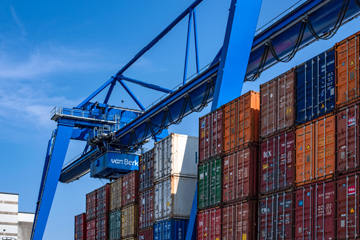
The Netherlands has long been a beacon for aspiring entrepreneurs, with its rich tradition of trade and commerce. Recently however, the landscape of distribution agreements in this great nation is undergoing an unprecedented shift – and it’s shaking up business as we know it. As a Dutch distribution agreement lawyer in the Netherlands, I will take you on a journey through the ins-and-outs of these agreements so that you can stay ahead of the curve when navigating your own deal. So settle down; grab some tea, because here’s what you need to know about distribution law in the Netherlands.
Distribution agreements under Dutch law are contracts between two parties which grant one party (the distributor) exclusive rights to market or sell another party’s products or services within a designated geographical area. These contracts have become increasingly important in today’s economy – especially considering the recent changes taking place in Dutch law. The new regulations are creating exciting opportunities for businesses seeking to expand their reach across Europe and beyond.
A Glimpse into the World of Distribution Contracts in the Netherlands
In order to ensure compliance, it is highly recommended that both parties seek professional legal advice when entering into such an arrangement. This section provides an overview of Duch Distribution Agreements, their purpose, and some key considerations for those looking to enter into one. Any further questions? Feel free to contact our distribution law firm in the Netherlands
Regulatory Requirements Of Distribution Deals In The Netherlands
It is estimated that over 1 million distribution agreements are concluded in the Netherlands every year. Understanding and complying with the applicable regulatory requirements of these contracts is essential to their successful implementation. In this section, we will discuss the legal obligations associated with a distribution agreement in the Netherlands, as well as common compliance requirements, dispute resolution procedures and litigation strategies.
First, any party entering into a distribution agreement must be aware of all relevant laws and regulations governing such an arrangement in order to ensure that it meets all necessary criteria for legal validity. This includes understanding which parties are involved (such as distributors or other intermediaries), what products may be distributed under the contract, licensing considerations, pricing structures and payment terms. Furthermore, local tax laws should be considered when negotiating a distribution agreement in order to avoid potential disputes down the line.
Second, there are certain compliance requirements that need to be met for a valid distribution agreement in the Netherlands; failure to do so could lead to sanctions by Dutch authorities or even civil lawsuits from affected third-parties. These include adhering to consumer protection laws (such as providing transparent information on product prices and availability) and anti-trust measures (like avoiding monopolistic behavior). It is also important that both parties understand their respective rights and obligations under Dutch law before signing a distribution deal.
Finally, if one or more parties fail to comply with the terms of a duly executed agreement then they can face significant financial penalties – including damages claims – through various dispute mechanisms available under Dutch legislation. As such, it’s advisable for businesses engaging in international transactions involving goods/services originating from The Netherlands to seek professional advice on how best manage any contractual disputes without resorting to expensive court proceedings. With this knowledge at hand companies can confidently enter into distribution arrangements knowing full well their legal obligations and how best protect themselves against future disputes or litigation risks.
Types Of Distribution Contracts In The Netherlands
When negotiating a distribution agreement in the Netherlands, there are several types of contracts that can be used. These include exclusive agreements, selective systems, and consignment arrangements. Each type has its own advantages and disadvantages which must be carefully considered before signing any contract.
Exclusive agreements provide an effective way to control the sale of goods or services within a specific geographic area. However, they can also limit competition and lead to higher prices for consumers if not handled properly. Selective systems give more flexibility when it comes to determining who will distribute products but require careful management so as not to exclude potential customers or distributors from outside the region. Consignment arrangements allow companies to send their products out on trial with no obligation to buy them back until they have been sold by the distributor. This gives businesses greater flexibility while reducing inventory costs and risk associated with storing excess stock.
Negotiating a distribution agreement in The Netherlands carries significant risks and rewards; making mistakes could cost your company time, money, and reputation. It is important to consider all aspects of each type of contract prior to entering into an agreement in order to ensure a successful outcome for both parties involved. To avoid common pitfalls such as failing to secure appropriate exclusivity clauses or setting unreasonable terms for return policies, legal professionals should always review contracts thoroughly before signing off on them.
Exclusive Agreements And Selective Systems In Holland
When negotiating a distribution agreement in the Netherlands, parties should be aware of two types of agreements that are commonly used: exclusive and selective systems. Exclusive agreements grant one distributor-exclusive rights to sell products within an agreed upon territory or market segment; while selective systems involve multiple distributors who have exclusive rights to operate within distinct geographic areas but may also include non-exclusive arrangements with other distributors within their respective territories.
It is important for companies to understand the risks associated with each type of arrangement when entering into a distribution agreement in the Netherlands. Companies must ensure that appropriate termination clauses are included in any distribution contract as this will allow them to end the relationship if necessary without incurring undue costs or disruption to their business operations. Furthermore, it is critical for all parties involved in a distribution agreement to fully understand the rights and obligations they hold under Dutch law so as to ensure fair treatment throughout the term of the contract.
Companies should take due care when drafting and executing a distribution agreement as well as understanding potential legal issues concerning antitrust laws, pricing regulations, consumer protection requirements, tax implications and intellectual property considerations. These factors can influence whether a company will be successful in enforcing its contractual terms or not and need careful consideration prior to finalizing any such arrangement. When these measures are taken properly, businesses can benefit from strong partnerships through mutually beneficial commercial relationships. Common mistakes when negotiating a distribution contract should therefore be avoided at all times.
Common Mistakes When Negotiating A Distribution Contract
When negotiating a distribution agreement in the Netherlands, there are several common pitfalls to avoid and important steps to take. It is essential for those involved in preparing for a distribution agreement in the Netherlands to familiarize themselves with the relevant laws and regulations that govern this type of contract. Additionally, knowing what actionable steps should be taken when drafting a distribution agreement can help ensure an agreeable outcome for all parties. Lastly, understanding appropriate negotiation strategies can also lead to successful negotiations.
One key mistake made during negotiations is failing to research Dutch legal requirements beforehand. Many times potential distributors may not understand how certain contractual clauses must comply with applicable laws or industry standards. Therefore, it’s necessary to have an expert review any proposed provisions before they become part of the final document. Furthermore, having clear expectations from each side is invaluable prior to entering into negotiations as it sets forth reasonable goals and limits which can then be discussed more efficiently.
Another frequent misstep occurs when negotiators don’t pay attention to details such as deadlines and payment terms. This often leads both sides into unnecessary disputes over small matters; thus wasting time and resources throughout the process. Moreover, failure to discuss termination clauses upfront puts both parties at risk if one decides later on that they no longer wish to proceed with the arrangement due unforeseen circumstances. With these issues in mind, taking intentional steps towards understanding termination clauses in Holland will make sure everyone is fully aware of their rights and obligations under the agreed upon terms before signing off on them.
By being mindful of these common mistakes when negotiating a distribution contract in The Netherlands, businesses can protect themselves from costly errors while minimizing misunderstandings between them and their partners down the line.
Understanding Termination Clauses In Holland
Having discussed the common mistakes when negotiating a distribution agreement in the Netherlands, it is important to understand and be aware of termination clauses that can affect such arrangements. Working with Dutch legal experts is essential for any business looking to renegotiate or enter into a distribution agreement; understanding the terms of such an arrangement is crucial for success.
When entering into a Dutch distribution agreement, there are several considerations which must be taken into account:
* The nature of the goods being distributed – this will determine how long parties may remain bound by the contract.
* Termination of a distribution agreement in the Netherlands – these should always be clearly set out so as to avoid confusion or disputes down the line.
* Legal obligations attached to each party’s performance – these may include warranties and other commitments made during negotiation or performance stages.
A well-drafted termination clause allows both parties to maintain control over their contractual relationship by setting out specific conditions which must be met before either side can terminate without penalty. It also provides clarity on what happens if one party breaches its obligations, allowing swift action where necessary. Additionally, including compensation provisions allows parties to recover losses incurred due to premature termination of the agreement. Finally, specifying a proper notice period ensures both sides have enough time to prepare for any changes that come with ending the contract.
By taking care of all potential contingencies within their Dutch distribution agreements, companies can ensure they get maximum value from their investments while minimising risks associated with renegotiation or early termination. This helps them protect their interests while ensuring equitable treatment between themselves and their distributors in Holland.
Termination Of A Dutch Distribution Agreement
Terminating a Dutch Distribution Agreement requires careful consideration. The termination of the agreement can be done in two ways – mutually, or unilaterally. In cases where both parties agree to terminate the distribution agreement, they must negotiate and draft an appropriate settlement agreement that meets all relevant legal requirements. On the other hand, unilateral termination is when one party terminates the contractual relationship without consulting with the other party. This should only occur if there are clear grounds for it in accordance with applicable law and/or contract terms.
When negotiating a Distribution Agreement in The Netherlands, it is important to consider not just its advantages but also any potential disadvantages that may arise from terminating such an agreement. For example, depending on how long the distributor has been active and their track record of success, there could be financial penalties for early termination associated with the costs incurred by them for setting up sales channels within The Netherlands. Additionally, either party can suffer reputational damage from an abrupt decision to end a successful business relationship without notice and proper negotiation procedures being followed first.
Examples of Distribution Agreements in The Netherlands vary between sectors and industries; nevertheless, each should include provisions outlining how disputes will be settled as well as what would constitute grounds for immediate termination of the agreement. It is therefore essential to ensure these clauses are sufficiently detailed so that either side understands their rights when considering ending this type of arrangement.
Understanding how best to approach Negotiations over Termination of a Dutch Distribution Agreement is key to protecting both parties’ interests while still allowing them to move forward independently at some point in time if necessary.
Steps For Drafting A Distribution Agreement
When it comes to doing business in the Netherlands, having an effective distribution agreement is essential. Many Dutch companies have experienced firsthand the benefits of having a clear and comprehensive distribution agreement that outlines each party’s rights and obligations. An anecdote can illustrate this point: A small startup was able to secure over €20 million in funding after they entered into a detailed agreement with their distributor. The clarity of the terms allowed them to be much more confident when pitching potential investors.
Writing a successful distribution agreement requires careful consideration of several factors such as pricing, payment terms, marketing activities, territory restrictions, etc. It is important for businesses to take the time necessary to ensure all aspects are properly addressed within the contract – failure to do so could potentially lead to costly future disputes or liabilities. To reduce risk further, both parties should seek legal advice from competent counsel prior to signing any document.
Businesses should not overlook other issues like warranties and intellectual property protection which may also need to be included in order for the arrangement between parties to be fully beneficial. Ensuring these matters are discussed and addressed helps guarantee that both sides will reap the rewards associated with having an effective distribution agreement in place in the Netherlands.
Potential Pitfalls To Avoid When Writing A Dutch distribution Agreement
When drafting a distribution agreement in the Netherlands, it is important to be aware of potential pitfalls. These may include:
1. Not being specific enough when writing clauses regarding payment terms and conditions.
2. Neglecting to provide clear guidelines for intellectual property rights or other confidential information that must remain private.
3. Failing to ensure compliance with applicable Dutch laws and regulations on matters such as food safety and consumer protection laws.
In order to avoid these issues, parties should strive for clarity in the agreement by defining all relevant terms precisely, laying out detailed processes and procedures, and setting forth any applicable legal requirements. Furthermore, both sides should review their respective obligations under the contract carefully before agreeing to its contents. This will help them make sure they are not exposed to unnecessary risks down the road. Having an experienced lawyer review the document can also be beneficial in ensuring no potential sources of conflict are overlooked during negotiations. With these considerations taken into account, parties can create a comprehensive distribution agreement tailored to their needs while remaining compliant with applicable law in the Netherlands. Moving forward, one must consider the advantages and disadvantages of such an agreement prior to entering into it.
Advantages And Disadvantages Of A Dutch Distribution Agreement
A distribution agreement in the Netherlands can be a powerful tool for businesses looking to expand their market reach. However, it is essential that all parties understand the advantages and drawbacks of such an agreement before entering into one. To illustrate this point, I recently had a client who was considering entering into a distribution agreement with another business in Amsterdam. After discussing the potential benefits and risks associated with such arrangements, we determined that it would ultimately prove beneficial for both sides.
The primary advantage of a distribution agreement is that it allows companies to more easily access new markets without incurring additional costs or risk factors. Furthermore, by having an established partner in place, firms are able to take advantage of economies of scale and further reduce expenses while expanding their customer base. Additionally, these agreements provide legal protection against any disputes which may arise between the two parties.
On the other hand, there are several possible disadvantages as well. For example, if either party fails to fulfil its obligations under the contract they could face serious consequences including hefty fines or termination of the arrangement altogether. In addition, due to the complexity of distributing products through different channels there is also a heightened possibility for misunderstandings leading to costly delays or even litigation; something no company wants to experience!
Having considered both sides carefully, my clients decided that forming a distribution agreement presented them with far more advantages than disadvantages and proceeded accordingly. Moving forward then let us consider now what implications such an arrangement has on scope within Dutch law…
Scope Of A distribution Agreement In The Netherlands
The scope of an agreement in the Netherlands should be defined clearly and precisely. This ensures that all parties involved understand their respective rights, obligations and liabilities under the contract. It is important to include specific details regarding performance, payment terms, remedies for breach, warranties and disclaimers. A well-drafted distribution agreement will help protect both parties from potential disputes by providing clarity on expectations.
In addition, it is also essential that any dispute resolution clauses are included in a distribution agreement entered into within the Netherlands. These clauses typically outline how any disputes or disagreements between the contracting parties shall be resolved before they can proceed to court action or arbitration. Such clauses may also contain provisions setting out certain jurisdictional requirements with respect to where litigation must take place if necessary.
Finally, while drafting a distribution agreement in the Netherlands it is advisable to ensure that the governing law clause specifies which national laws apply to the interpretation of such agreements – this helps avoid conflicting interpretations down the line. With these considerations taken into account, both parties can then work towards enforcing their rights should any disagreement arise during the term of their contractual relationship. As such, it is critical that clear definitions of each party’s roles and responsibilities are established at outset through careful consideration of what constitutes a valid agreement which meets Dutch statutory requirements.
With an understanding of how best to define a distribution agreement in the Netherlands now established, attention turns towards enforcement measures available when contracts have been breached or otherwise fail to provide adequate protection for either party’s interests.
Enforcing Agreements In The Netherlands
Just as a hammer strikes nails, so too does the law enforce agreements in the Netherlands. This section will discuss the legal framework regulating contractual enforcement and remedies for breach of contract.
* Contractual obligations are legally binding on both parties;
* A court may provide various damages to remedy a party’s loss or injury due to breach of contract;
* Injunctive relief is available in special circumstances.
Under Dutch civil code (Burgerlijk Wetboek) Article 6:119, each contracting party has an obligation to perform its agreement according to good faith standards. If either party fails to comply with their duty under the contract, they can be held liable by the other party and subject to contractual penalty if provided for in advance. The aggrieved party also has a right to seek compensatory damage from the non-compliant party which could include lost revenue or profits resulting from the breach of contract. Additionally, courts may grant injunctive relief when necessary, such as ordering specific performance of a promise made under an agreement or prohibiting one side from taking action that would cause harm during litigation proceedings.
In order to properly enforce contracts in the Netherlands, it is important to understand all rights and obligations associated with them. Thus, this brings us naturally into our next section about understanding rights and obligations of distributors when entering into distribution agreements within the country’s borders.
Rights And Obligations Of Distributors
Distributors have a duty to market and sell the Company’s products. They must comply with all applicable laws in their activities as distributors, including those related to professional conduct, advertising, marketing, sales practices and consumer protection. Distributors also have an obligation to inform consumers of any safety warnings or product recalls issued by the Company.
The Company has the right to review and approve products before they are put on sale. This includes promotional materials that relate directly to its products. The Company reserves the right to make changes at any time to these terms of agreement if it believes such actions are necessary for proper management of its business operations.
In order to ensure quality control, the Company will provide training sessions on its products’ features and benefits upon request from distributors. In addition, it may inspect distribution centers periodically and require corrective action where appropriate. Both parties agree this is not intended as a punitive measure but rather as a means of ensuring customer satisfaction.
These rights and obligations between both parties establish an equitable relationship that allows for mutual trust and cooperation; however, circumstances can change over time which necessitates renegotiation of contract terms accordingly.
Renegotiating Terms Of An Agreement under Dutch law
As previously discussed, when an agreement between a distributor and a supplier is in place, both parties must adhere to the terms of that contract. However, it may become necessary to renegotiate certain aspects of the agreement over time. In this section, we will discuss how distributors can go about renegotiating terms to ensure their interests are satisfied going forward.
* Consider whether modifications should be made at all – First of all, distributors should assess if any changes need to be made or if they’re content with the current arrangement.
* Draft a letter proposing new terms– If renegotiation is desired then distributors should draft a formal letter outlining what they hope to achieve from any amended arrangements. This document serves as evidence of communication should disputes arise later on down the line.
* Negotiations should take place – Following submission of the proposed amendments, negotiations with relevant stakeholders must take place in order for there to be resolution. It’s important for each party’s respective legal representatives to attend meetings involving such discussions so that positions and rights remain protected throughout proceedings.
* Agree upon revised clauses – Finally, once both sides have agreed upon revisions which satisfy them both, these clauses should be included within a legally binding document along with original provisions from before changes were made.
It is therefore essential for Dutch suppliers and distributors alike to understand the process involved in rewriting contractual agreements prior to engaging in business together; doing so could save considerable time and expense further down the road when dealing with potential disputes or litigation related thereto.
Disputes And Litigation Related To Agreements in Holland
When disputes arise between the parties to a Distribution Agreement, it is important for them to properly address and resolve those issues. In the Netherlands, both mediation and arbitration can be used as viable methods of dispute resolution. Mediation involves bringing in an impartial third-party mediator who will work with both sides to come up with mutually acceptable solutions. Arbitration provides a more formal process where each party presents their case before an independent arbitrator who then makes a final decision based on the evidence presented.
In addition, Dutch law also allows parties to take legal action against one another if they cannot reach an agreement through other means. This may involve taking the matter to court or filing a complaint with the relevant government agency responsible for dealing with such matters. Parties should always consult qualified legal counsel prior to initiating any kind of legal action due to the complexities involved in litigation proceedings.
No matter which route is taken by either side, all parties must ensure that their rights are respected throughout the entire process and that no unfair decisions are made at any time. Taking this approach ensures fairness and protects everyone’s best interests when handling potential disagreements related to Distribution Agreements in The Netherlands.
Frequently Asked Questions
What Is The Duration Of A Distribution Agreement In The Netherlands?
When it comes to the duration of a distribution agreement, there are several important factors to consider. Typically speaking, these agreements can range from one year up to five years – or even longer if specified in the contract. It’s essential for both parties involved to understand the terms and conditions of their arrangement so that they may remain compliant with all applicable laws. Let’s take a closer look at what you need to know about the length of a distribution agreement:
1. The initial term of any such agreement is typically set by Dutch law; however, either party may choose to extend the term beyond this point depending on their specific needs.
2. In some cases, the parties may opt for an open-ended agreement which continues until terminated by either side in accordance with its provisions.
3. Regardless of how long it lasts, all valid contracts must be formally documented before being entered into force and given legal effect.
It should also be noted that certain types of agreements require additional considerations when setting out the length of time they will apply for – such as those involving intellectual property rights or international transactions. Depending on your circumstances, you might want to seek advice from a qualified attorney who is familiar with Dutch regulations and can help guide you through this complex area of business law. Doing so will ensure that your interests are properly protected throughout the entire duration of your contract.
Having said that, having a clear understanding of each party’s responsibilities and obligations ahead of time is always recommended practice when entering into any kind of distributorship arrangement – especially one governed by Dutch authorities. This way everyone knows exactly where they stand during each phase, allowing them to make necessary changes (if needed) while avoiding unnecessary disputes down the line.
What Is The Process For Establishing A Distribution Agreement In The Netherlands?
Establishing a distribution agreement in the Netherlands requires navigating various complexities and adhering to specific rules. As an experienced Dutch legal expert, I can shed some light on this process for those unfamiliar with it.
To begin with, you must understand that such agreements are legally binding contracts between two or more parties. They establish the rights each party has regarding the sale of goods or services within a specified period of time. This means they will affect both parties’ obligations towards each other as well as any third-party entities involved in the arrangement.
In order to enter into a valid contract, there are certain criteria which must be met first; these include mutual consent by all parties and consideration (payment) of something valuable from one party to another. Additionally, depending on the type of product being distributed, you may need to obtain certain permits or authorisations before engaging in business activities related to your distribution agreement. It is therefore wise to consult with a lawyer who specialises in Dutch law beforehand so that everything is properly documented and executed according to applicable regulations.
The final step is signing off on the deal – but not without making sure everyone’s interests have been considered and protected against potential risks or disputes down the road! The document should clearly outline the specifics about what each side does and does not agree upon, including delivery timescales and payment terms amongst others. When done right, setting up this sort of contractual relationship allows companies to expand their market reach while still ensuring that their products remain safe and secure throughout their journey across international borders.
How Can Disputes Related To A Distribution Agreement Be Resolved?
When entering into a distribution agreement, it is important to consider how disputes between the parties can be resolved. Disputes may arise in relation to various aspects of the contract, such as pricing or delivery terms. In order to determine how these issues can be addressed, it is essential to understand the legal framework governing resolution of such matters in The Netherlands.
In The Netherlands, there are several options for resolving disputes arising from a distribution agreement. For example, parties may choose to enter into arbitration proceedings or submit their dispute to an independent mediator for resolution. Alternatively, they can bring the matter before a court of law and seek judgement on the issue at hand.
Whichever option is chosen by the parties involved, it is advisable that any dispute resolution mechanism should be clearly stated within the original contract itself so that all parties have a clear understanding of their rights and obligations if a disagreement arises during performance of the agreement. This will ensure that both sides know where they stand and what methods will be used to resolve any potential conflicts without having to resort to litigation – which can often prove expensive and time-consuming.
What Are The Differences Between Exclusive And Selective Distribution Agreements?
A distribution agreement is a contract between two parties, usually involving the sale and supply of goods. It is important to understand the differences between exclusive and selective distribution agreements when considering entering into such an arrangement. In this article, we will explore these distinctions in detail.
To start off, an exclusive distribution agreement means that only one distributor has been granted permission to sell a certain product or service within a specific market area. This type of agreement enables manufacturers to control how their products are sold and ensures exclusivity for the chosen party. On the other hand, a selective distribution agreement allows multiple distributors to offer the same product or service in the same geographical region but does not grant any special privileges or advantages over competitors.
When negotiating either of these arrangements it is essential to consider both its benefits and drawbacks; with exclusive agreements there is more stability as you know who your primary customer base will be however due to limited competition prices may remain higher than necessary. Selective agreements can provide greater opportunities for growth while allowing you more flexibility as you are able to choose additional partners if needed; however they also make it easier for rival businesses to enter the market and gain market share quickly which could have negative implications on your profits should your pricing strategy not be competitive enough.
It’s clear then that understanding the differences between exclusive and selective distribution agreements is key when setting up contractual arrangements with customers and suppliers alike – so take time to research thoroughly before making any decisions!
How Can I Ensure That My Distribution Agreement Is Legally Enforceable?
Ensuring your distribution agreement is legally enforceable can be a tricky task. To make sure that both parties understand their rights and obligations, it’s important to have an accurate understanding of the applicable legal framework. As a Dutch legal expert, I’d like to share some tips on how you can effectively protect yourself and ensure the legality of your distribution agreement in the Netherlands.
Firstly, it’s essential to be aware of any local or European regulations which may affect the terms of your contract. For instance, distributors should not impose exclusive dealing arrangements without first obtaining permission from the relevant competition authority. Additionally, you’ll need to consider whether any existing contracts between other parties could influence yours.
To guarantee that your agreement is valid under Dutch law, there are several steps you should take:
– Draft an explicit document outlining all aspects of the arrangement;
– Include clauses for dispute resolution and termination procedures;
– Specify each party’s responsibilities as well as product liability coverage;
– Ensure that both parties sign off on the document before entering into a binding contractual relationship.
In addition to these practical measures, it’s also worth considering indemnity insurance cover which will help to protect against potential losses due to breaches of contract or third party claims related to wrongful acts by either party during its performance of the agreement. Taking such precautions will give you peace of mind when entering into a distribution agreement in the Netherlands and provide additional security if something were ever go wrong.
Contact our Dutch distribution lawyer
As a Dutch legal expert, I can say with absolute certainty that establishing and maintaining a distribution agreement in the Netherlands is no small feat. The duration of these agreements must be carefully considered as they often have an impact on the success or failure of both parties involved in the business relationship. Moreover, it is essential to understand the differences between exclusive and selective distribution agreements before entering into any contract.
It should also be noted that disputes related to a distribution agreement may arise at any time; however, there are numerous pathways for resolution available which could help protect all parties from unnecessary financial losses. Finally, if you want your distribution agreement to be legally enforceable, then it’s critical to ensure that it complies with all relevant laws and regulations within the country. This will go a long way towards preventing costly litigation down the line!
In conclusion, given its complexity and importance, creating and managing a successful distribution agreement in the Netherlands requires careful planning and diligent attention to detail. With this knowledge firmly in mind – as well as my expertise – you’ll find yourself better able to navigate through each step of this process safely and securely.







